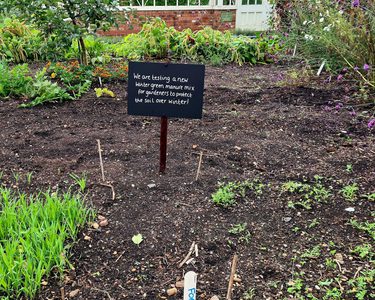Grow green at your allotment plot
This National Allotment Week, we’re offering five tips for growing green manures so you can nurture the soil on your veg plot.

Green manures can be a simple and natural way to improve soil health
An organic allotment is built from the ground up, with worms and fungi below ground, and butterflies and birds and, hopefully, lots of homegrown produce above ground.
Green manures can play a key part in maintaining soil health, as they help reduce the leaching of nutrients from wind and rain, improve soil structure and add organic matter when they break down. In the right conditions some green manures can also fix nitrogen.
Here’s our top five tips for growing them on your allotment plot:
- Plan in advance. Make sure you have some seed ready to fill in any gaps that appear on your plot, and you have the right seed for the right job.
- Don’t sow too late. Many green manures – including clovers and vetch – should be sown by the beginning of September. This advice is worth heeding because when you sow them later, they never really get to the size where they cover the ground adequately. If space does not become available on your plot until later in the year, it’s best to grow field bean, forage peas or grazing rye.
- Sow the seeds at the right depth. Clover seed is very small so should be sown at a very shallow depth, whereas larger seed such as vetch or field beans should be sown deeper. The general rule is sow to a depth of two or three times the size of the seed.
- Don’t leave green manures too long in the ground. Although it might be tempting to allow pods to form on field beans or forage peas, this will lead to a mass of tough stalks that are difficult to dig in.
- Leave enough time before the next crop. The plant material needs around six weeks to break down. If you haven’t left enough time, and don’t want to dig the plants in - put the green material on the compost instead so you can benefit from it later.
Find out more about green manures in our soil hub at gardenorganic.org.uk/soil or find a list of popular green manures and when/how to grow them here.